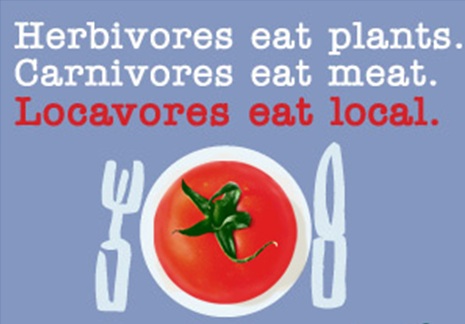I
had never heard the term “locavore” before coming to Berea College in
2010. I have been interested in localism and sustainability for quite
some time, but I didn’t realize the local food movement had established
its own descriptive term. The locavore movement presents an opportunity
for people to reexamine how they live their lives; are people
comfortable buying food from halfway around the country or the world? Do
people place value on the security of knowing who grows their food?
Locavorism’s relatively small-scale success so far has come by appealing
to people’s ecological values, and presenting what looks like a viable
alternative to highly industrial food systems that make up the majority
of food production today. The locavore movement has a good deal of
substance, but the movement’s lasting potential is threatened with
narrow and rigid goals.
Personally, I find “locavore” to be a limiting term. From my
experience growing up in Nevada City, California, many people are
interested in localizing their lives far beyond the food they eat. In
lieu of the volatility and inconsistency of the U.S. economy, people are
attempting to regain control over their finances and banks by joining
institutions such as credit unions, which promise more local control and
input compared to national corporate banks. It is possible that my
perspective is slightly biased having grown up in an area with very
independent individuals who seem to constantly investigate new
possibilities of engaging in transactions with others. However, it is
apparent that more businesses and institutions are succeeding based on
their commitment to local ownership and transactions. Daniel F. Agan
Jr., President of the Massachusetts Credit Union League, recently
explained, “Credit union growth is being fueled by their commitment to
the local community.” [i]
Despite the passion and claims of some, I do not believe the locavore
or local movement in general will expand primarily because of
environmental concerns. People’s environmental concern will play a role
in it, but I have my doubts that environmentalism alone will lead to a
sustainable route of localism. People have different ideas of what
constitutes environmental sustainability and how to achieve those goals.
Very few would state that the heart of the environmental movement comes
down to the food that we choose to eat. Locavorism can play a major
part in environmental awareness and concern, but environmental issues
stretch beyond whether we buy our food from the farmer down the street
or from farmers in South America. In other words, you are likely some
form of an environmentalist if you are a locavore, but you do not have
to be a locavore to be an environmentalist. Locavores will limit the
potential of local food expansion if they publicize the movement largely
on environmental grounds, because there are numerous other
environmental movements competing for attention and support from the
very same crowd.
Economic influences and preferences drive individual decisions more
than anything else. People vote with their dollars and naturally support
businesses and systems they value over other current options. For
example, just because Wal-Mart offers the cheapest produce doesn’t mean
that people won’t support a local farmer for a few extra dollars; if it
is fresh, locally grown produce people value, they are probably willing
to dish out some extra cash if necessary. Every action comes down to the
personal value people place on something. This is what the movement of
locavorism must publicize if they want to send a sustainable and lasting
message to people. Preserving the environment is great, but if
locavores can show people that they can preserve the environment and
maybe save a few bucks by supporting local agriculture, the movement
will have a much higher likelihood of sticking around for the long haul.
If you don’t appeal to the economic interests of people, your movement
will have a very difficult time sticking. (CONTINUE READING)
